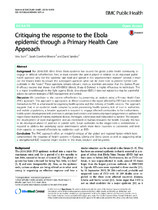Critiquing the response to the Ebola epidemic through a Primary Health Care Approach
Abstract
BACKGROUND: The 2014/2015 West Africa Ebola epidemic has caused the global public health community to
engage in difficult self-reflection. First, it must consider the part it played in relation to an important public
health question: why did this epidemic take hold and spread in this unprecedented manner? Second, it must
use the lessons learnt to answer the subsequent question: what can be done now to prevent further such
outbreaks in the future? These questions remain relevant, even as scientists announce that the Guinea Phase
III efficacy vaccine trial shows that rVSV-EBOV (Merck, Sharp & Dohme) is highly efficacious in individuals. This
is a major breakthrough in the fight against Ebola virus disease (EVD). It does not replace but may be a powerful
adjunct to current strategies of EVD management and control.
DISCUSSION: We contribute to the current self-reflection by presenting an analysis using a Primary Health Care
(PHC) approach. This approach is appropriate as African countries in the region affected by EVD have recommitted
themselves to PHC as a framework for organising health systems and the delivery of health services. The approach
suggests that, in an epidemic made complex by weak pre-existing health systems, lack of trust in authorities
and mobile populations, a broader approach is required to engage affected communities. In the medium-term
health system development with attention to primary level services and community-based programmes to address the
major disease burden of malaria, diarrhoeal disease, meningitis, tuberculosis and malnutrition is needed. This requires
the development of local management and an investment in human resources for health. Crucially this has
to be developed ahead of, and not in parallel with, future outbreaks. In the longer-term a commitment is
required to address the underlying social determinants which make these countries so vulnerable, and limit
their capacity to respond effectively to, epidemics such as EVD.
CONCLUSION: The PHC approach offers an insightful critique of the global and regional factors which have
compromised the response of health systems in Guinea, Liberia and Sierra Leone as well as suggesting what
a strengthened EVD response might involve in the short, medium and long-term.

